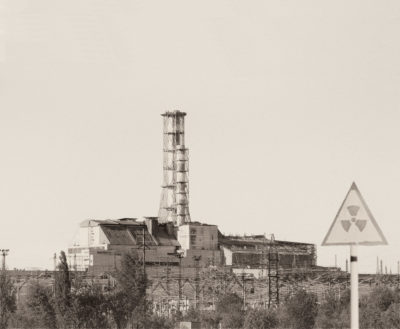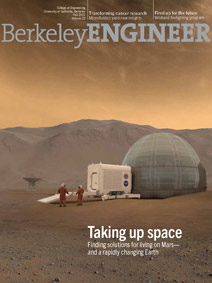Aiding Chernobyl
After the Russian occupation of the Chernobyl Nuclear Power Plant in Ukraine in spring 2022, scientists returned to the site to find ransacked offices and labs. Computers and other valuable equipment had been stolen or destroyed. Radioactive dust had been kicked up by heavy trucks and small fires, spreading contamination throughout the area.

Chernobyl Nuclear reactor 4, which exploded in 1986
To help in the relief effort, nuclear engineers at Berkeley have been testing and refurbishing critical equipment to send to Chernobyl, the site of a 1986 nuclear explosion that spread radioactive contamination throughout the region. Dangerous levels of radioactivity still linger at the location. Even before the current war, the scientists working there were often forced to rely on old and outdated equipment.
Since 2017, graduate student Jake Hecla and other nuclear engineers at Berkeley have been collaborating with Chernobyl scientists, demonstrating state-of-the-art nuclear detection systems to help monitor the radiation at the plant. Now that the Russian invasion has left these scientists without even the most basic tools, the team is also donating useful equipment.
The first batch of instruments — a set of sodium-iodide gamma-ray detectors for monitoring lingering radiological contamination in soil and vegetation — shipped in July. Hecla and graduate student Michael Bondin are also testing much higher-resolution high-purity germanium detectors to potentially send to Ukraine. Over the years, Berkeley scientists have used these detectors as part of systems designed to detect radiological threats to national security and to study radiological background signatures in the environment. Now, they will be used to help Chernobyl scientists rebuild their labs.
The team is also working with Ukrainian scientists and leaders to identify ways that advanced 3D-mapping technologies can address ongoing concerns at the power plant, and more broadly, respond to possible scenarios in which large amounts of radioactivity are released.
“The war has turned what was a desperate situation into one that is absolutely dire,” said Kai Vetter, professor of nuclear engineering. “We believe strongly in providing the expertise and equipment that we have available.”
Learn more: UC Berkeley engineers send equipment, expertise to ransacked Chernobyl (Berkeley News)
